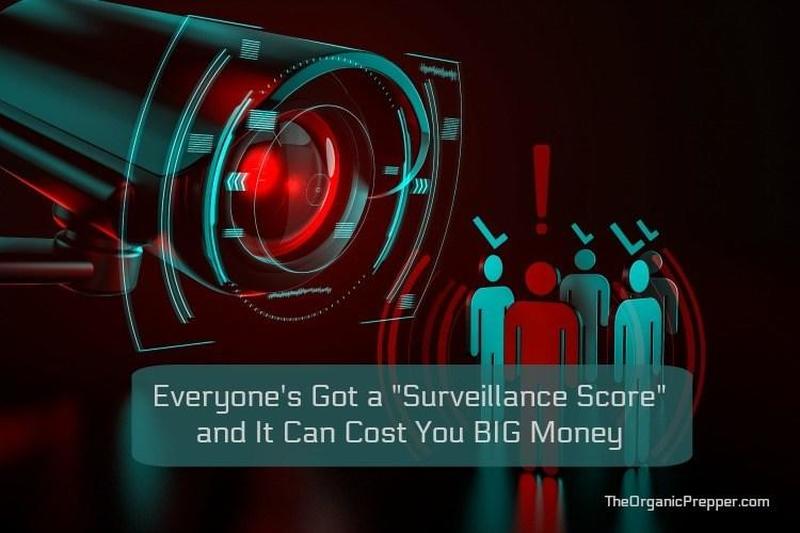Authored by Dagny Taggart via Our Organic Prepper blog,
In these Orwellian times, when it is revealed that yet another government agency is spying on us in yet another way, most of us arenât one bit surprised. Being surveilled nearly everywhere we go (and even in our own homes) has become the norm, unfortunately.

Yesterday, it was revealed that the NSA improperly collected Americansâ call and text logs in November 2017 and in February and October 2018 â just months after the agency claimed it was going to delete the 620 million-plus call detail records it already had stockpiled.
But this article isnât about that.
It is about something far more insidious.
When it comes to spying on people, the government has competition.
The Chinese government is currently implementing a social credit system to monitor its 1.3 billion citizens (China already has 200 million public surveillance cameras). Facial recognition technology and personal data from cell phones and digital transactions are being used to collect intimate details about peopleâs lives, including their purchasing habits and whom they socialize with.
The gathered data is used to create mandatory social credit ratings for every citizen. These ratings will score citizensâ âgeneral worthinessâ and provide those with higher scores opportunities like access to jobs, loans, and travel. Those with lower scores will not have access to those opportunities.
While the United States government has yet to implement such a system, companies in the country are, reports The Hill:
Consumer advocates are pushing regulators to investigate what they paint as a shadowy online practice where retailers use consumer information collected by data brokers to decide how much to charge individual customers or the quality of service theyâll offer.
#REPRESENT, a public interest group run by the Consumer Education Foundation in California, filed a complaint with the Federal Trade Commission (FTC) on Monday asking the agency to investigate what the group is calling âsurveillance scoringâ of customersâ financial status or creditworthiness. (source)
Companies are using Secret Surveillance Scores to evaluate you.
The opening paragraphs of the 38-page complaint are chilling:
Major American corporations, including online and retail businesses, employers and landlords are using Secret Surveillance Scores to charge some people higher prices for the same product than others, to provide some people with better customer services than others, to deny some consumers the right to purchase services or buy or return products while allowing others to do so and even to deny people housing and jobs.
The Secret Surveillance Scores are generated by a shadowy group of privacy-busting firms that operate in dark recesses of the American marketplace. They collect thousands or even tens of thousands of intimate details of each personâs life â enough information, it is thought, to literally predetermine a personâs behavior â either directly or through data brokers. Then, in what is euphemistically referred to as âdata analytics,â the firmsâ engineers write software algorithms that instruct computers to parse a personâs data trail and develop a digital âmug shot.â Eventually, that individual profile is reduced to a number â the score â and transmitted to corporate clients looking for ways to take advantage of, or even avoid, the consumer. The scoring system is automatic and instantaneous. None of this is disclosed to the consumer: the existence of the algorithm, the application of the Surveillance Score or even that they have become the victim of a technological scheme that just a few years ago would appear only in a dystopian science fiction novel. (source)
These scores are used to discriminate based on income.
Written by lawyers Laura Antonini, the policy director of the Consumer Education Foundation, and Harvey Rosenfield, who leads the foundation, the complaint highlights four areas in which companies are using surveillance scoring: pricing, customer service, fraud prevention, and housing and employment.
âThis is a way for companies to discriminate against users based on income and wealth,â Antonini told The Hill.
âIt can range from monetary harm or basic necessities of life that youâre not getting.â
Antonini and Rosenfield argue that the practices outlined in the complaint are illegal â and that consumers are largely unaware that theyâre being secretly evaluated in ways that can influence how much they pay online.
âThe ability of corporations to target, manipulate and discriminate against Americans is unprecedented and inconsistent with the principles of competition and free markets,â the complaint reads. âSurveillance scoring promotes inequality by empowering companies to decide which consumers they want to do business with and on what terms, weeding out the people who they deem less valuable. Such discrimination is as much a threat to democracy as it is to a free market.â
Stores are using this scoring system to charge you higher prices.
Hereâs more detail, from The Hill:
The filing points to a 2014 Northeastern University study exploring the ways that companies like Home Depot and Walmart use consumer data to customize prices for different customers. Rosenfield and Antonini replicated the study using an online tool that compares prices that theyâre charged on their own computers with their own data profiles versus the prices charged to a user browsing sites through an anonymized computer server with no data history.
What they found was that Walmart and Home Depot were offering lower prices on a number of products to the anonymous computer. In the search results for âwhite paintâ on Home Depotâs website, Rosenfield and Antonini were seeing higher prices for six of the first 24 items that popped up.
In one example, a five-gallon tub of Glidden premium exterior paint would have cost them $119 compared with $101 for the anonymous computer.
A similar pattern emerged on Walmartâs website. The two lawyers found the site was charging them more on a variety of items compared with the anonymous web tool, including paper towels, highlighters, pens and paint.
One paper towel holder cost $10 less for the blank web user. (source)
To see screenshots of different âpersonalizedâ prices shown for items from Home Depot and Walmart, please see pages 12-16 of the complaint. The examples presented demonstrate just how much these inflated prices for common household goods can really add up.
The travel industry is particularly sneaky.
more,,,,,,,,,,,,,,,,,,
http://www.zerohedge.com/news/2019-06-29/everyones-got-surveillance-score-and-it-can-cost-you-big-money?utm_source=feedburner&utm_medium=feed&utm_campaign=Feed%3A+zerohedge%2Ffeed+%28zero+hedge+-+on+a+long+enough+timeline%2C+the+survival+rate+for+everyone+drops+to+zero%29
A new ACLU report titled âThe Dawn of Robot Surveillanceâ describes how emerging AI technology enables security companies to constantly monitor and collect data about people.
âGrowth in the use and effectiveness of artificial intelligence techniques has been so rapid that people havenât had time to assimilate a new understanding of what is being done, and what the consequences of data collection and privacy invasions can be,â the report concludes.

Realist - Everybody in America is soft, and hates conflict. The cure for this, both in politics and social life, is the same -- hardihood. Give them raw truth.
